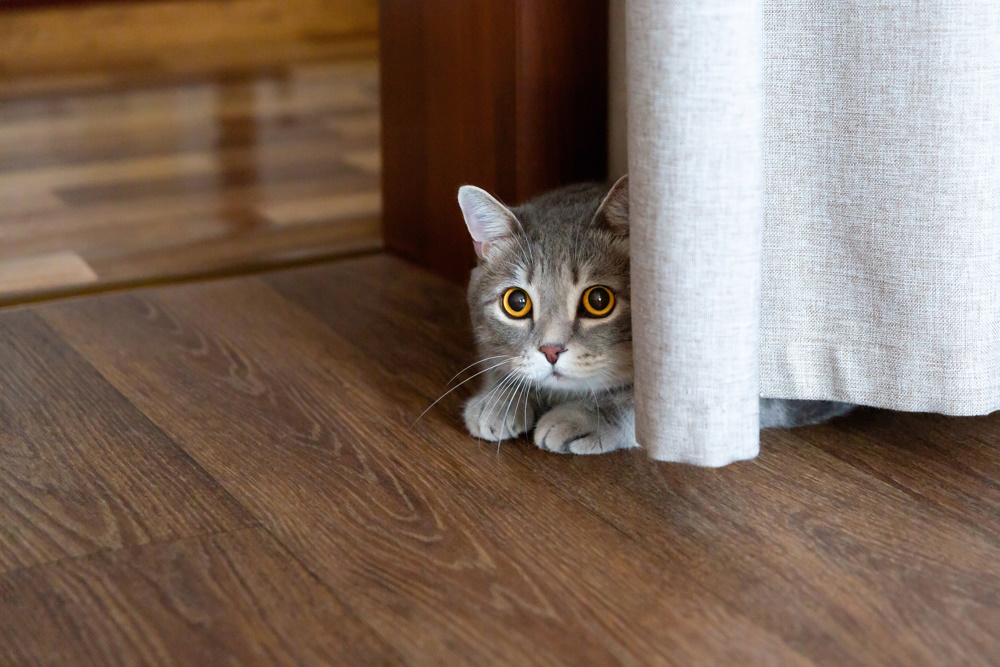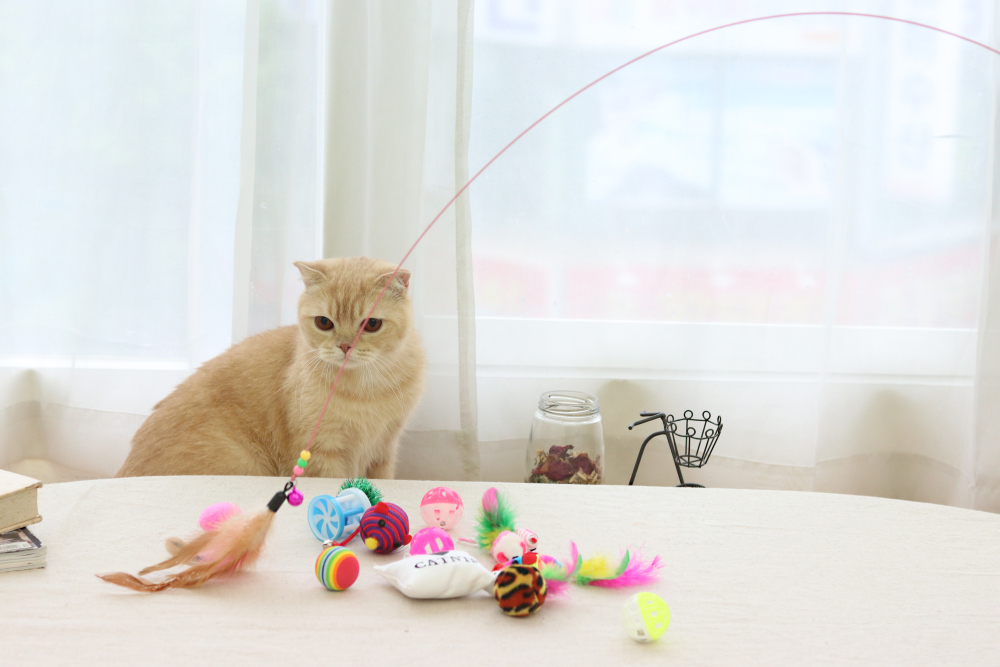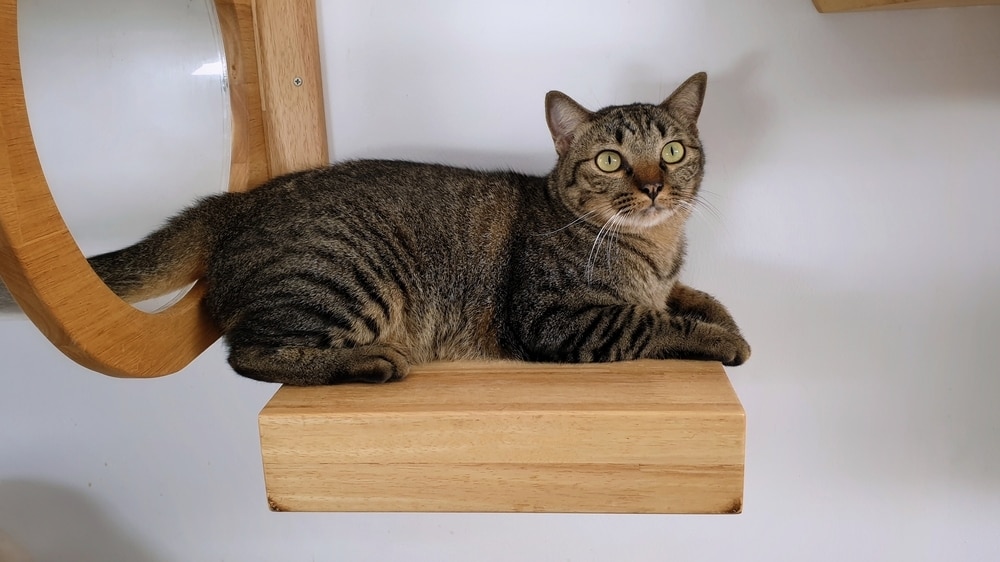Playing with your cat is a great way to pass the time, get a few laughs, and build a close bond with your feline friend. Not only that, but it’s also necessary to keep your cat happy.
Each cat finds enjoyment in their own way, which is why it’s necessary to learn a few different ways to play with them. Find what your cat truly enjoys doing, and then spend some time hanging out with them and having fun every single day!
The 10 Tips & Ideas for Playing With Your Cat
1. Hide-and-Seek

There are several different ways to play hide-and-seek with your cat. You can hide and have them find you, or you can hide a few of their favorite toys or treats. It’s all about finding the best option for you and your cat.
It’s a great way to get you and your cat moving, and it can help the two of you form a bond. Cats also love turning this game into a way to hunt and stalk “prey”, and since it’s all about getting your cat interested and involved, this could be a really good option.
2. Teach Them Tricks
While it’s certainly easier to teach a dog a few new tricks, it’s also completely possible to teach your cat a wide range of commands and tricks as well. Not only does it lead to a well-behaved cat, but you’ll also get some valuable bonding time while offering mental stimulation.
Stick solely with positive reinforcement when training your cat, and if you really want to get them to listen, you better bring a few of their favorite treats as a motivator!
3. Fetch

Who said fetch is just for dogs? While it’s certainly a more popular game for dogs, there are plenty of cats that enjoy a good game of fetch. Whether it’s chasing after a ball or their favorite mouse toy, it can be a great way to stimulate their prey drive.
You might need to teach them to bring the toy back by rewarding them with treats, but once they get the hang of it, you’ll have a cat bringing you a toy to throw throughout the day. What better way to get them moving?
4. Introduce Catnip
If you haven’t introduced your cat to catnip yet, you’re in for a world of fun. Cats simply can’t get enough of the stuff, and because of this, it can be a great training aid or a way to play with them.
You can stuff it in various toys, hide it throughout your home, or get creative with it in other ways. The important thing is to find a way to get your cat moving. However, it is estimated that roughly half of cats won’t have a reaction to it, so this might not work for your pet specifically.1
5. Buy a New Toy

Whether you’re at Wal-Mart, on Amazon, or at a dedicated pet store, there’s no shortage of fun cat toys. There are feather fishing rods, fake fish, pet-safe laser pointers, and more.
Picking up a few of the classics is almost always a safe bet, but get enough so you can cycle them in and out whenever they get bored with one. Having more options keeps your cat interested longer and provides some valuable bonding opportunities.
6. Make a New Toy
Just because you don’t want to rush out to the store to buy your cat something new doesn’t mean you can’t come up with some great new toys for them. Cats are simple creatures in many ways, so something as simple as a box or a rolled-up piece of paper can be enough to occupy them for hours.
Ensure that whatever toy you come up with is safe for them to play with, then try to get creative to really get your cat interested in the new toy. This is where that catnip might come into play!
7. Make an Obstacle Course

If you have a little extra time on your hands, a bunch of creativity, and a semi-willing cat, an obstacle course can be the perfect way to play with your cat. Ensure there are a few treats at the end of the course to keep your cat interested, and then watch your cat’s brain work while they try to figure out how to get to the treat. Just don’t be surprised when they find a creative way to get around things, even if it’s not what you had in mind.
8. Use Treat-Dispensing Toys
Let’s face it, nothing gets a cat moving quite like food. So, if you can find a way to incorporate some of their favorite treats into their toys, it’s a surefire way to get them to play with you.
This can be a food puzzle toy, a toy with catnip in it, or simply you giving them the occasional treat while playing with them. Simply by adding some treats to their playtime, you’re more likely to lock in their attention, and it turns the whole experience into a stronger bonding moment. However, you need to be careful with how many calories you offer, as treats should ideally be around 5% of their diet, but preferably under 10%.2 Even if you’re using their regular food, ensure that you’re not offering more food than you normally would in a day.
9. Blow Bubbles

Kids love bubbles, and it turns out most cats do too, as they can’t help but bat at them while they float through the air. It’s a perfectly safe and low-cost way to entertain your cat, so long as you are providing pet-safe bubbles and not those made for humans. Not only can it lead to hours of endless fun watching your cat trying to pop all the bubbles, but it’s also a way for you to actively engage with them while they’re playing.
10. Find a Tablet Game
If you already have a tablet or a smartphone, there are countless games you can download to play with your cat. While you can play these games on a smartphone with your cat, the bigger the screen, the better.
Keep in mind that not every cat likes every game, so you might need to try a few different options before you find one that piques your pet’s interest. Turn up the volume to get the noise involved and turn up the brightness on the screen so both you and your cat can easily see what’s going on.
Conclusion
Playing with your cat is good fun for everyone, and now that you have a few different options to try, all that’s left is for you to find some time to play with them.
Every cat is going to have their own preferences, so find what works for them, and if it’s not an option your cat likes, don’t push them. The important thing is you find something you both like and stick to it!
Featured Image Credit: Kmpzzz, Shutterstock












